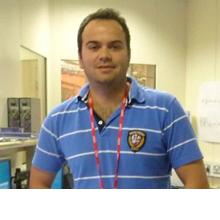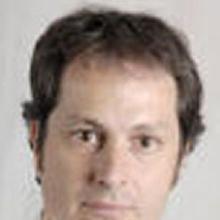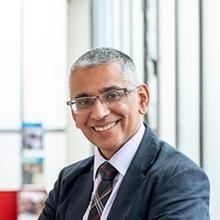National cancer research funding for IfLS academics
National cancer research funding will enable a trio of Institute for Life Sciences (IfLS) academics to further develop their research into the battle against cancer.
The three researchers - Dr Salah Mansour (Senior Research Fellow in Clinical and Experimental Sciences), Dr Tilman Sanchez-Elsner (Associate Professor in Biomedical Sciences) and Professor Salim Khakoo (Associate Dean (Enterprise) and Director of Biomedical Research) - have received a total of £847,000 from Cancer Research UK (CRUK).
Salah has received £301,000 CRUK funding to investigate how a group of white blood cells that are called T cells may detect lipid changes in cancer.
He said: “We have shown that several tumour associated lipids are recognised by T cells. We would like to understand the molecular basis underpinning T cell recognition of tumour associated lipids and the potential contribution of those T cells in eliminating cancer.
“This will improve our understanding of the molecular mechanisms that regulate these highly abundant, yet largely understudied, human T cells, in order to harness their potential in future immunotherapy.”
Salah’s funding came about through a networking meeting between the University of Southampton, the Francis Crick Institute and St George’s, and is just one of a number of growing links between the University and the Francis Crick Institute that is dedicated to understanding the fundamental biology underlying health and disease.
He said: “The award builds on this initial meeting and will allow us to explore tissue resident lipid reactive T cells in collaboration with the Crick Institute.
“I was delighted to receive this funding because I am a young principal investigator and it isn’t easy to get funding at this stage in my career. This award sets the platform to develop my research programme, build my group, publish high quality papers, and hopefully acquire future funding.”
Tilman will use the three-year £296,000 funding to explore potential immunotherapies and ways to improve the immune response for lung cancer tumours.
He said: “This is my first grant in cancer research and I feel that we can make a huge difference, by using state of the art techniques such as micro-scale sequencing of purified cells, with well characterised clinical samples.
“Lung cancer is the cancer that causes the most deaths worldwide and immunotherapy treatments are now starting to prove effective against it. We want to improve our understanding about which patients will benefit most from which treatment, as well as, using new drugs to hopefully enhance the efficacy of treatment.”
Tilman’s research is the result of a collaboration between the University of Southampton’s Clinical and Experimental Sciences, and Cancer Sciences, and La Jolla Institute for Allergy and Immunology, in the USA.
Salim received a three-year £250,000 CRUK funding to start developing a new form of cancer therapy, particularly liver cancer – one of the most difficult to treat diseases.
His research studies natural killer cells – cells of the innate immune system that have a potent anti-cancer activity and harnessing their activity is difficult and cumbersome.
Salim said: “I was delighted to receive a grant from CRUK from their immunology scheme that will enable us to develop a new way to do this based on a vaccination strategy. It will capitalise on work we have already done studying natural killer cell responses in viral infections, including hepatitis C and the Zika and Dengue viruses.”
Director of the IfLS Professor Peter Smith, said: “This CRUK funding is recognition of the innovative research that our members are carrying out. We anticipate it will have a significant impact on the future of healthcare.”


